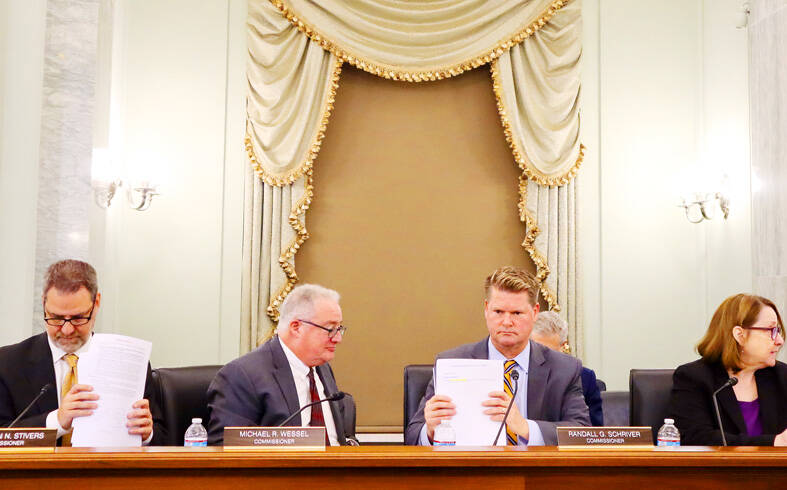The US should amend a law to add Taiwan to the list of “NATO Plus” allies and streamline future arms sales, a US commission said on Tuesday in its annual report to the US Congress.
The recommendation was made in the annual report by the US-China Economic and Security Review Commission (USCC), which contained chapters on US-China economic and trade ties, security relations, and Taiwan and Hong Kong.
In the chapter on Taiwan, the commission urged the US Congress to “amend the Arms Export Control Act of 1976 to include Taiwan on the list of ‘NATO Plus’ recipients,” referring to a designation held by South Korea, Japan, Australia, Israel and New Zealand.

US-China Economic and Security Review Commission Commissioner Randall Shriver, second right, and other members on the commission speak at a news conference in Washington yesterday.
Photo: CNA
Under the Arms Export Control Act, arms sales to NATO Plus countries only have to be approved by Congress if they exceed US$25 million. Arms sales to Taiwan require congressional approval if they surpass US$14 million.
At a congressional hearing, USCC member and former Pentagon official Randall Schriver said Taiwan’s inclusion in NATO Plus would add it to “the most elite category of security assistance partners” and “ease the process of export control review on potential transfers to Taiwan.”
The commission also recommended that Congress create a “Taiwan Allies Fund” that would provide foreign assistance only to countries that have an official diplomatic relationship with Taiwan.
Under the proposed program, “no country could receive more than 15 percent of the appropriated funding each year.”
“Countries that no longer have a diplomatic relationship with Taiwan would immediately be ineligible for this funding,” the commission said.
In a section on Taiwan’s implications for the US, the report said Taiwan “remains a key flashpoint for conflict with China,” particularly as Beijing intensifies pressure on Taipei, raising the risk of a miscalculation.
It also argued that Taiwan faces “complex decisions” about resource allocation, as it looks to simultaneously counter China’s “gray zone” tactics and adopt equipment more appropriate for countering an invasion.
While the US can assist Taiwan in both areas, it also faces challenges in rapidly arming Taiwan because of defense manufacturing limitations and extended delivery timelines, it said.
As a result, “Taiwan is unlikely to be armed to a sufficient degree to deter or counter China from invading on its own, and so it will rely on the United States to provide for its deterrence as the PLA [the Chinese People’s Liberation Army] continues to approach its 2027 and mid-century modernization goals,” the report said.
“Even if it can be deterred from outright invasion, China continues to build the capability to quarantine or blockade the island, which represents a unique challenge for US and Taiwan leaders,” it said.
Although Taiwanese chipmaker Taiwan Semiconductor Manufacturing Co (TSMC, 台積電) has invested in building production facilities in the US, Taiwan still remains “by far the most dominant” in advanced semiconductor production, the commission said.
Any disruption to output on the nation would therefore have “major ramifications for the global economy and — more importantly — US national and economic security,” the report said.
The USCC was created by Congress in 2000 and is required to submit to the Congress an annual report on the national security implications of the bilateral trade and economic relationship between the US and China, and to provide recommendations for legislative and administrative actions.
Source: Taipei Times - 2024/11/21




















